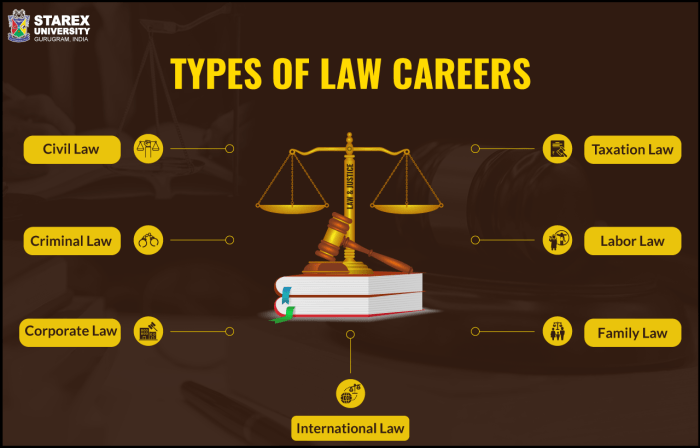
What can you do with a law degree? This question often arises for aspiring students and even those already navigating their career paths. A law degree is a versatile credential, opening doors to a wide range of professions beyond the traditional courtroom setting. It equips individuals with critical thinking, analytical, and communication skills that are highly sought after in various fields. Whether you envision yourself as a legal advocate, a business leader, or a social change agent, a law degree can be a powerful tool in achieving your goals.
From the traditional legal careers of lawyers, judges, and prosecutors to the specialized fields of corporate law, environmental law, and intellectual property law, the legal profession offers a diverse range of opportunities. But a law degree’s value extends far beyond the legal realm. The analytical and problem-solving skills honed through legal education are highly transferable to fields such as business, government, and academia. For entrepreneurs, a law degree provides a strong foundation for navigating the legal complexities of starting and running a business. In public service, a law degree empowers individuals to advocate for social justice and public policy initiatives.
Legal Careers

A law degree opens doors to a wide range of legal careers, both traditional and specialized. While becoming a lawyer is the most common path, there are many other fulfilling and impactful roles that utilize legal knowledge and skills.
Traditional Legal Career Paths
Traditional legal career paths involve direct application of legal principles and advocacy. These roles are often associated with the courtroom and require strong analytical, communication, and research skills.
- Lawyer: Lawyers represent clients in legal matters, advocating for their interests in court and providing legal advice. They may specialize in various areas of law, such as criminal defense, family law, or corporate law.
- Judge: Judges preside over court proceedings, interpret the law, and make decisions based on evidence and legal precedent. They play a crucial role in ensuring fairness and upholding the rule of law.
- Prosecutor: Prosecutors represent the government in criminal cases, bringing charges against individuals accused of crimes. They must present evidence and argue for convictions in court.
Specialized Legal Fields
Lawyers often specialize in specific areas of law, allowing them to develop deep expertise and cater to specific client needs. Here are a few examples of specialized legal fields:
- Corporate Law: Corporate lawyers advise businesses on legal matters, such as mergers and acquisitions, contracts, and regulatory compliance. They ensure that businesses operate within legal boundaries and achieve their objectives.
- Environmental Law: Environmental lawyers focus on protecting the environment and natural resources. They may work on issues related to pollution, land use, and climate change, advocating for sustainable practices and environmental justice.
- Intellectual Property Law: Intellectual property lawyers specialize in protecting creative works, inventions, and trademarks. They help individuals and businesses secure and enforce their intellectual property rights, ensuring their creations are protected and valued.
Non-Legal Careers
A law degree is not just a ticket to a career in a courtroom. The skills and knowledge gained through legal education are highly valuable in a wide range of non-legal professions. From business and government to academia and beyond, a law degree can open doors to diverse and rewarding career paths.
Business
A law degree equips individuals with a strong foundation in critical thinking, problem-solving, and analytical skills – essential assets in the dynamic world of business. Legal knowledge can be particularly advantageous in areas like corporate law, contract negotiation, and regulatory compliance.
Legal education fosters a deep understanding of business structures, contracts, and regulatory frameworks. This knowledge is highly relevant for roles such as:
- Corporate Counsel: Provides legal advice to companies on a wide range of matters, including contracts, compliance, and corporate governance.
- Business Development Manager: Leverages legal expertise to identify and assess business opportunities, negotiate contracts, and manage risks.
- Compliance Officer: Ensures that companies adhere to relevant laws and regulations, mitigating legal risks and protecting the organization’s reputation.
Government
The ability to analyze complex issues, articulate arguments persuasively, and navigate bureaucratic processes makes a law degree a valuable asset in government service.
Legal professionals with a strong understanding of public policy, administrative law, and legislative processes are sought after for roles such as:
- Government Lawyer: Provides legal advice to government agencies and officials on a range of issues, including regulatory matters, public contracts, and litigation.
- Policy Analyst: Conducts research, analyzes data, and develops policy recommendations on a wide range of issues, drawing upon legal knowledge and expertise.
- Lobbyist: Advocates for specific policy positions on behalf of clients, utilizing legal knowledge to understand the legislative process and influence policy decisions.
Academia
A law degree can be a stepping stone to a fulfilling career in academia, where legal expertise and research skills are highly valued.
Law graduates with a passion for research and teaching can pursue roles such as:
- Law Professor: Conducts legal research, teaches law courses, and contributes to the advancement of legal scholarship.
- Legal Scholar: Engages in independent research and publishes scholarly articles on legal topics, contributing to the development of legal theory and practice.
- University Administrator: Applies legal knowledge and analytical skills to manage legal affairs and ensure compliance with regulations within a university setting.
Public Service

A law degree can be a powerful tool for making a positive impact on society. While many lawyers choose to pursue traditional legal careers, a law degree can also open doors to fulfilling and impactful roles in public service. Public service encompasses a wide range of organizations dedicated to serving the public good, including non-profit organizations, government agencies, and advocacy groups.
Public Service Roles
Lawyers in public service often work to address pressing social issues, protect the rights of vulnerable populations, and promote equitable access to justice. These roles can be incredibly rewarding, allowing individuals to use their legal skills to create meaningful change. Here are some examples of specific positions within public service organizations that require legal expertise:
- Legal Counsel for Non-Profit Organizations: Non-profit organizations rely on legal counsel to ensure they are operating in compliance with applicable laws and regulations. Lawyers in this role may advise on a wide range of legal matters, including governance, fundraising, contracts, and intellectual property.
- Government Attorneys: Government agencies at all levels (federal, state, and local) employ lawyers to represent the government in legal proceedings, draft legislation, and provide legal advice to government officials. Examples include attorneys working for the Department of Justice, state attorneys general, and city attorneys’ offices.
- Advocacy Lawyers: Advocacy groups focus on specific social issues, such as environmental protection, human rights, or criminal justice reform. Lawyers in this role often use their legal expertise to advocate for policy changes, challenge discriminatory practices, and represent individuals who have been denied their rights.
Advocating for Social Justice, What can you do with a law degree
A law degree can be a powerful tool for advocating for social justice and public policy initiatives. Lawyers can use their legal knowledge to:
- Draft and Lobby for Legislation: Lawyers can play a key role in shaping public policy by drafting legislation and lobbying for its passage. They can leverage their understanding of the law to craft effective legislation that addresses specific social problems.
- File Lawsuits and Engage in Litigation: Lawyers can use litigation to challenge discriminatory practices, enforce civil rights, and protect the environment. They can bring lawsuits to hold individuals and institutions accountable for their actions.
- Educate and Mobilize Communities: Lawyers can use their knowledge of the law to educate communities about their rights and empower them to advocate for themselves. They can organize community forums, workshops, and legal clinics to provide legal assistance and information.
Advanced Legal Studies

For those seeking a deeper understanding of the law and its intricacies, advanced legal studies offer a path to specialized knowledge and expertise. Pursuing a master’s degree in law (LLM) or a doctorate in law (JSD or SJD) allows individuals to delve into specific legal areas, engage in cutting-edge research, and prepare for careers in academia, legal research, or highly specialized legal practice.
Benefits of Advanced Legal Studies
Advanced legal studies provide numerous benefits, including:
- Specialized Knowledge and Expertise: LLM and JSD programs allow students to focus on specific legal areas, such as international law, environmental law, or intellectual property law, developing in-depth knowledge and expertise. This specialization can open doors to specialized legal practice or research opportunities.
- Enhanced Research Skills: Advanced legal studies emphasize research methodologies, critical thinking, and analytical skills, preparing students for careers in legal research, academia, or policy analysis.
- Teaching and Academic Opportunities: An LLM or JSD can be a stepping stone to academic careers, enabling individuals to teach law, conduct research, and contribute to legal scholarship.
- Professional Advancement: Advanced legal degrees can enhance career prospects in the legal profession, particularly in specialized areas like international law or tax law.
Master’s Degree in Law (LLM)
The Master of Laws (LLM) is a postgraduate degree designed for lawyers and legal professionals seeking to specialize in a particular area of law. LLM programs typically focus on a specific legal field, such as international law, tax law, or intellectual property law. The curriculum often includes advanced coursework, seminars, and research opportunities, allowing students to delve deeper into their chosen area of study.
Doctorate in Law (JSD or SJD)
A Doctorate in Law, also known as a Doctor of Juridical Science (JSD) or a Doctor of the Science of Law (SJD), is a research-focused degree that prepares individuals for careers in academia, legal research, or policy analysis. JSD/SJD programs require students to conduct original research and produce a dissertation that makes a significant contribution to legal scholarship.
Prominent Legal Scholars and Researchers with Advanced Degrees
Many prominent legal scholars and researchers hold advanced legal degrees. For example,
- Professor Ruth Bader Ginsburg, Associate Justice of the Supreme Court of the United States, holds a JSD from Columbia University.
- Professor Cass Sunstein, former Administrator of the White House Office of Information and Regulatory Affairs, holds a JSD from Harvard Law School.
- Professor Lawrence Lessig, a leading scholar in the field of internet law, holds a JSD from Yale Law School.
Last Recap
A law degree is more than just a ticket to a legal career. It’s a powerful tool that can unlock a wide range of possibilities, equipping individuals with valuable skills and knowledge to succeed in diverse fields. Whether you aspire to a traditional legal career, a non-legal profession, or a path of entrepreneurship or public service, a law degree can provide the foundation for a fulfilling and impactful journey.
FAQs: What Can You Do With A Law Degree
Is a law degree worth it?
The value of a law degree depends on your career goals and aspirations. It can be a valuable investment for those seeking careers in law, business, government, or public service.
What are the different types of law degrees?
The most common law degree is the Juris Doctor (JD), which is required for practicing law in most jurisdictions. Other types of law degrees include Master of Laws (LLM) and Doctor of Juridical Science (SJD), which are advanced degrees for specialized legal study and research.
What are the job prospects for law graduates?
Job prospects for law graduates vary depending on the specific field and location. While some areas of law may be more competitive, a law degree can open doors to a wide range of opportunities.
How much does it cost to get a law degree?
The cost of a law degree varies depending on the institution and program. Tuition, fees, and living expenses should be considered when budgeting for law school.




